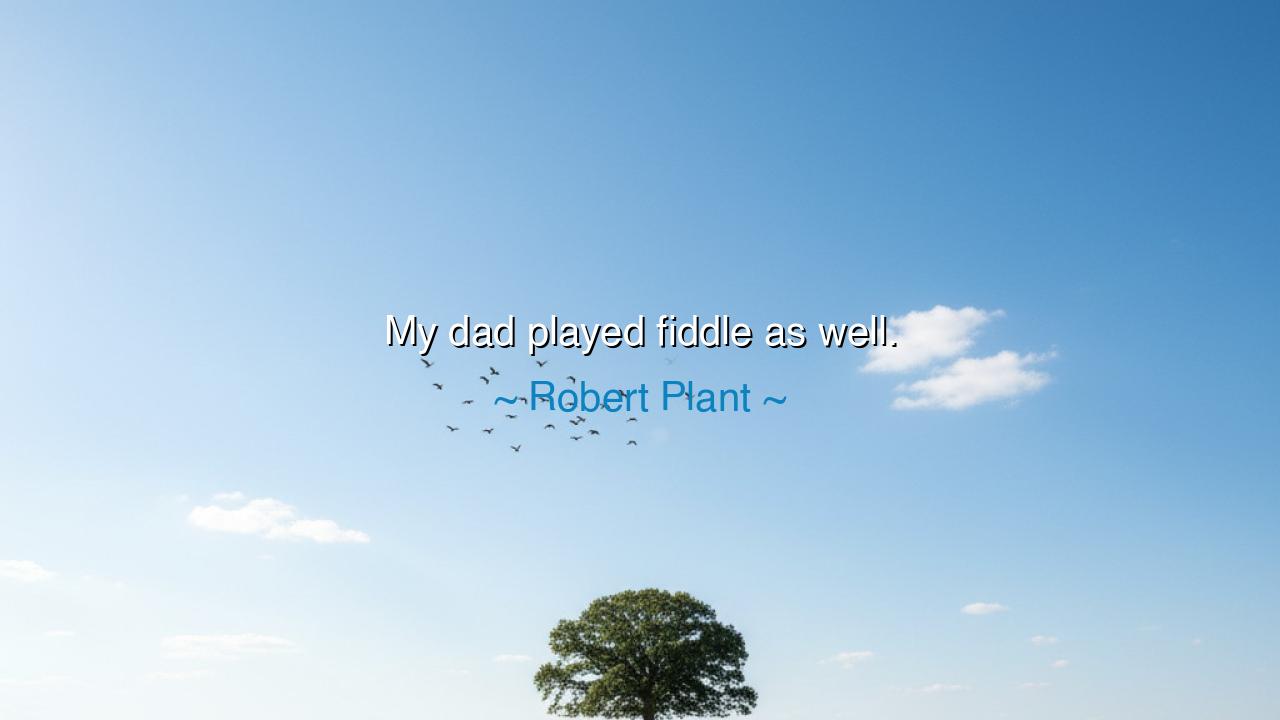
My dad played fiddle as well.






“My dad played fiddle as well.” — Robert Plant
Thus spoke Robert Plant, the golden voice of rock and the mystic poet of Led Zeppelin, in words that shimmer not with grandeur but with memory. In this brief sentence lies a whole world — the echo of music passed down from father to son, the quiet inheritance of rhythm, tone, and soul. To say that his father played fiddle is to speak of roots, of the hidden river of influence that nourishes the artist long before fame or mastery ever take shape. It is not the boast of lineage, but the whisper of gratitude — an acknowledgment that even the mightiest trees grow from unseen seeds.
The origin of this quote arises from Plant’s own reflection on the family that shaped him. Before he became the voice of “Stairway to Heaven,” before he filled stadiums with fire and thunder, there was a household filled with melody — the simple, humble kind. His father, a man of music and discipline, played the fiddle, an instrument older than nations, whose voice carries the laughter and lament of the human heart. That sound, delicate and haunting, found its way into the young boy’s imagination, and though Plant would one day stride into the storm of rock and roll, his spirit never forgot the quiet strings of home.
For the fiddle is no ordinary instrument — it is the soul of storytelling in sound. Across centuries, it has sung of joy and sorrow, of love found and lost. It is an instrument of emotion rather than perfection, alive in the hands of those who play not for applause, but for connection. In saying that his father played the fiddle, Plant recalls more than just an instrument — he remembers the music of belonging, the cadence of a life where art was not career, but companion. It is this inheritance of spirit, rather than technique, that gave birth to the depth of feeling found in his own songs.
Such a bond between generations is as ancient as the wind. Consider Johann Sebastian Bach, whose father, Ambrosius Bach, was himself a musician of humble means. The young Johann grew up in a household where every evening the air shimmered with sound. What the father played, the son transformed — from melody to symphony, from craft to divine expression. Just as the elder Bach’s bow drew music from string, so too did his example draw genius from the heart of his child. Thus, in Plant’s words we find not mere nostalgia, but the echo of that same eternal pattern: the transmission of art through love and presence.
In this light, the phrase “My dad played fiddle as well” becomes a statement of spiritual lineage. It is as if Plant is saying, “The music did not begin with me — it has always been.” Every artist, every dreamer, stands upon the foundation of those who came before — not always in blood, but in spirit. The father with his fiddle, the mother with her stories, the teacher with their wisdom — all are part of the great chorus of human creativity, an unbroken melody that flows through generations, reshaping itself with each new voice.
There is also humility in his remembrance. Though Plant reached the heights of global fame, he returns, in this moment, to the simplicity of his origins. It is a gentle reminder that greatness begins in small places — in homes where art is nurtured not by ambition, but by love. In the sound of the fiddle, he learned that music is not about conquest, but communion — that to play, to sing, to create, is to share one’s soul. The world would later know him as a legend, but the man himself knows he is still the child of a fiddler, still a student of that timeless melody.
Let this, then, be the lesson: never forget the music that shaped you. Whether your inheritance is song, kindness, craft, or courage, cherish it. The gifts passed down by those before you are not to be hidden, but to be transformed. Do not despise humble beginnings; for from the small bow of a fiddle can rise the voice that moves the world. The truest artists — and indeed, the truest souls — are those who remember where their song began.
So, my child of the future, when you speak of your own greatness, remember the quiet hands that taught you — the parents, mentors, and ancestors who hummed the first notes of your destiny. Honor them not by imitation, but by creation. Let their melody live on in your own song, just as Robert Plant’s father’s fiddle lives on in the thunder and tenderness of his voice. For though the instruments change, the music of love endures — unbroken, eternal, and ever playing through the hearts of those who listen.






AAdministratorAdministrator
Welcome, honored guests. Please leave a comment, we will respond soon